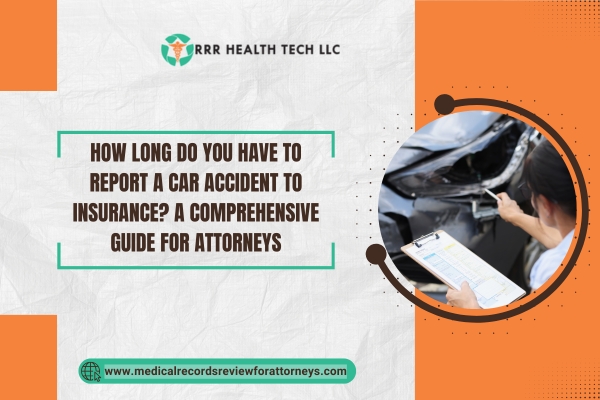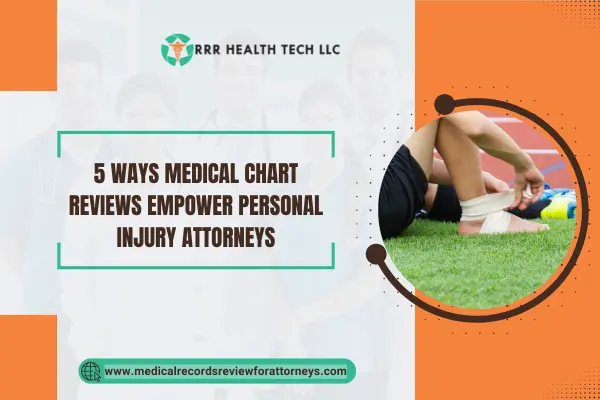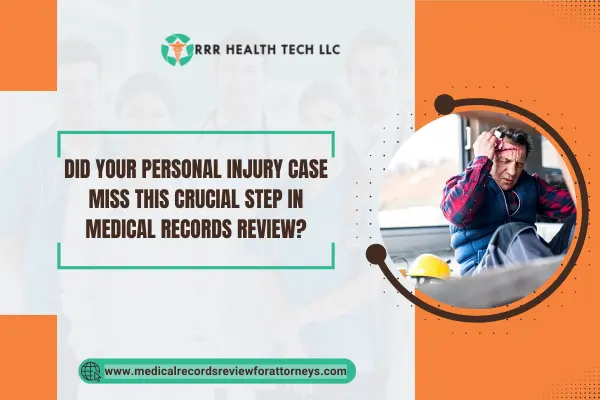
Introduction
For victims of a car accident, one of the priorities that they have on their agenda comprehends how long they can wait before making an insurance claim. This is quite a challenge and if one doesn’t meet certain time frames, their claim could be compromised. Attorneys that work with clients in personal injury suits definitely need to be knowledgeable about these timelines. In this article, I will discuss the details around the reporting of motor vehicle accidents to insurance companies, the consequences of reviewing the medical records, and how an attorney or lawyer can manage the process.
Understanding the Reporting Timeline
General Reporting Requirements
- It is crucial to file an accident report to the police once it’s safe to do so. Doing this makes sure a police report is done and preserves important information for claims down the road.
- Some Laws are State Specific: Every state has its own set of laws on the reporting of car accidents. Most of them make it mandatory to report all accidents that lead to injury, fatalities, or destruction of property that is substantial.
Insurance Reporting Deadlines
• Deadlines Specific to Policies: Almost every insurance policy will state that claims “must be reported immediately,” however many insurance companies suggest that it is better to do so within 30 days to sidestep issues.
• Issues of Reporting Delay: Missing to report within the indicated time period can cause problems like claims denial. Thus, lawyers need to ensure that clients are making reports within a reasonable time span.
Key Factors Influencing Reporting Timelines
Type of Insurance Coverage
- Liability Insurance: Liability would cover damages that the insured person does unto third parties as a result of an accident.
- Collision Insurance: Covers physical damage to the policyholder’s car, for any reason at all.
- Comprehensive Insurance: Protection against damages not related to collision.
Severity of the Accident
• Injury or Death: Collisions with injuries or death are much more sensitive in terms of reporting and usually require telling both the police and insurance firms.
• Damage to Property: Major damages to residential premises could also active specific reporting requirements.
The Role of Medical Records Review
Importance for Attorneys
- Establishing Damages: Medical records are crucial in substantiating claims for damages related to injuries sustained in an accident.
- Strengthening Claims: A thorough review of medical records can help attorneys build a stronger case by providing clear evidence of the impact of the accident on the client’s health and finances.
The Medical Records Review Process
- Compilation of Records: Having the client’s permission, procure relevant medical records.
- Reviewing Data: Check if the records are complete and relevant for the case.
- Findings Summarization: Draft a summary report to capture pertinent medical records.
Common Challenges in Reporting Accidents
Incomplete Information
• Issue: Clients are bound to have less than complete information about the incident which can further push the timeline forward.
• Solution: In such cases the attorney needs to explain what information is essential and how it can be collected.
Misunderstanding Policy Terms
• Issue: There is always a chance that clients have an inadequate understanding of the scope of coverage, which increases uncertainty with respect to what needs to be reported.
• Solution: The explanation of such terms should rest solely with the attorneys, allowing for better understanding of the document and scope of coverage.
Case Studies
Case Study 1: Timely Reporting and Successful Claim
Case Brief: A covered client suffered a fender bender and submitted the claim with supporting documentation to their licensed adjuster within the day.
Problems: Client was confused to what damages have incurred as well as what damages the claim will cover.
Solutions: The attorney suggested to the client to report the incident as soon as possible and assisted them in compiling the necessary documents including the medical files.
Compensation: The client was reimbursed in full for the vehicle repairs and medical treatment as the claim was submitted on time.
Case Study 2: Delayed Reporting and Complications
Overview of the Case: A client did not report a grave accident for a long time as they were unsure how their insurance policy worked.
Challenges: Claim was rejected by the insurance company because they deemed the reporting of the claim to be tardy.
Solutions: The attorney had to examine the insurance policy but it was clear that the client did have a valid case. However, he did have to appeal the denial.
Compensation: The client was compensated for his medical expenses and the amount he could not earn after his appeal was largely successful.
Conclusion
Insurance policyholders and lawyers need to understand the duration within which they need to inform the insurance company regarding a car accident. A better understanding of particular necessities and the impacts of postponed informing can assist the attorneys in navigating their clients through filing a claim. Furthermore, effective use of medical records review services improves the robustness of a case by ensuring that all relevant aspects are considered. This article was written with the purpose of educating attorneys on the insurance reporting time frame and the legal issues surrounding it to better defend their clients’ interests.


